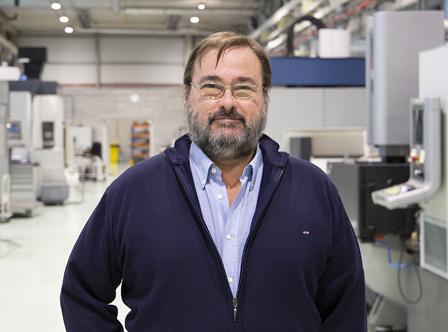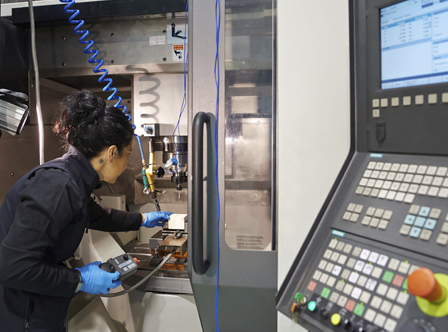THE EXPERT'S VIEW



Our past shows that Basque industries have always adapted to the times. In recent years, the focus has shifted towards the revolution that Industry 4.0 has brought about for the processing sector. Obviously, this is not only a wonderful opportunity, but also a major challenge. Nowadays, advanced manufacturing is a key element to set up competitive and efficient manufacturing processes in a globalised economy. It is clear that, in order to properly address this challenge, we must attach innovation to company value chains.
For decades, the industrial sector has been the main driving force for Basque economy, as demonstrated by the figures: its contribution in 2018 accounted for 24,4% of the GDP (Source: Euskadi.eus).
This economic strength, however, means that Basque companies must deliver products and services that give added value to international markets and this means they must become involved in the major revolution experienced by the industry over the last few years. In fact, 65% of our Basque companies are already developing digitisation processes, a figure that has only been surpassed by Finland with 68%. (Source: Euskadi.eus).
Technological development in industrial production
In this race towards excellence, moreover, advanced manufacturing is becoming increasing relevant as a key discipline. Digitisation, smart systems, new manufacturing technologies and materials, energy efficiency and sustainability are but a few of the trends that appeared in this scenario a few years ago, although they have recently become much more noticeable. The fact is that technological developments can be transferred to the world of industrial production and terms such as wearables, robotised surgery or smart electric grids, among others, are becoming more prevalent in our society.
All of these changes have not only given rise to many opportunities in the industrial sector, but have brought about a number of challenges that industrial companies are currently addressing. Consequently, it is essential for companies to intensify their efforts to become highly competitive and strengthen their value proposals.
What new skills should companies develop?
In this context, companies should focus on developing smart and safe production resources (Industry 4.0) to implement smart technologies in the production environment with regard to equipment (sensors, robotics, person-machine interfaces), plants (process simulation, supervision, collaborative robotics) and the cloud (cloud computing, cibersecurity, Big Data, etc.).
If a company wants to stand out relative to the competition, it must manufacture outstanding products. It will be crucial, therefore, to incorporate new materials and manufacturing processes: new process using new materials, process hybridisation, measurement and control systems, etc., or simulation.
Likewise, achieving a manufacturing ecosystem based on energy efficiency and a “zero emissions” goal are another two significant issues companies must deal with. Consequently, the following areas are essential: efficient processes (optimising production processes, heat recovery, etc.), proper energy use (storage and transformation of thermal power and its reutilisation, etc.) and minimal environmental impacts (integrating renewables, capturing CO2, etc.).
How can we address these challenges from the point of view of technological innovation?
Manufacturing processes and resources (advanced manufacturing) are one of IK4-TEKNIKER’s strategic areas of knowledge. The technology centre, in fact, has major technological capabilities related to manufacturing activities.
On the one hand, the organisation carries out both conventional (milling, turning, micro-milling) and non-conventional processes at a macro, micro and nano-scale (laser, ultrasounds, EDM, white room technologies, NIL, etc.). On the other, mechatronics and precision engineering are connected to designing and building special machines and equipment to be delivered on a turnkey basis.
The centre also develops cognitive systems such as 2D and 3D vision, image processing, tracking and navigation and person-machine interactions. All of this is based on real-time data processing, monitoring and sensoring applied to process control and the promising world of robotics.
Another of the activities carried out by the organisation addresses the regulation and control of machine tool systems and chemical plants or wind farms. IK4-TEKNIKER has developed advanced control solutions for a number of systems, although special attention has been paid to mechatronic systems with demanding requirements with regard response accuracy, speed or dynamics.
A change is under way
IK4-TEKNIKER is currently developing more than 100 projects in the field of advanced manufacturing. Hereunder are listed three different examples: SMAPRO, MH2020 and Hyperdrill.
The aim of the collaborative project called SMAPRO directed by IK4-TEKNIKER is to carry out comprehensive research actions on data analysis, simulation and monitoring technologies to configure an agile, hybrid modelling platform that will enable equipment manufacturers, and specifically their users, to significantly optimise their processes in terms of design, ramp-ups, production life cycles and adaptation to new requirements. It will also serve to enhance their quality and reliability ratios.
As far as industrial metrology is concerned, the aim of the MH2020 initiative for strategic collaborative research is to make machine tools more efficient throughout their entire work volume. Specifically, the ultimate goal is make it possible for the Basque Country to offer equipment capable of measuring with dimensional traceability.
Lastly, the innovative European Hyperdrill project is focused on developing a machine based on laser technology to manufacture large micro-drilled panels for commercial plane tail wing stabilisers in order to reduce fuel consumption.
Ultimately, our ongoing applied research work coupled with a close cooperation in the industry provide the assurance required need to cope with future challenges.



